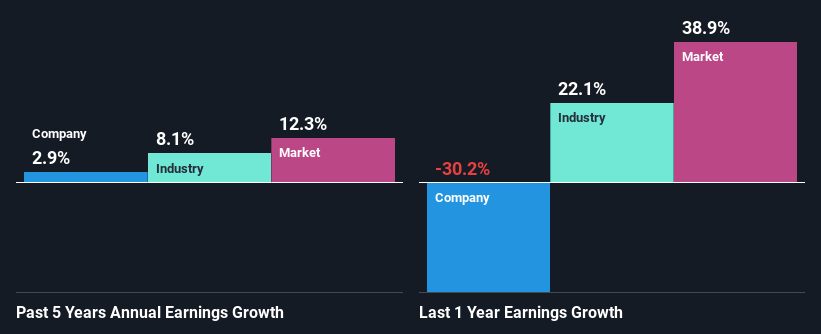Is Proto Labs, Inc.'s (NYSE:PRLB) Stock Price Struggling As A Result Of Its Mixed Financials?
Proto Labs (NYSE:PRLB) has had a rough three months with its share price down 20%. It seems that the market might have completely ignored the positive aspects of the company's fundamentals and decided to weigh-in more on the negative aspects. Stock prices are usually driven by a company’s financial performance over the long term, and therefore we decided to pay more attention to the company's financial performance. Particularly, we will be paying attention to Proto Labs' ROE today.
Return on Equity or ROE is a test of how effectively a company is growing its value and managing investors’ money. In simpler terms, it measures the profitability of a company in relation to shareholder's equity.
See our latest analysis for Proto Labs
How To Calculate Return On Equity?
The formula for return on equity is:
Return on Equity = Net Profit (from continuing operations) ÷ Shareholders' Equity
So, based on the above formula, the ROE for Proto Labs is:
4.9% = US$41m ÷ US$832m (Based on the trailing twelve months to June 2021).
The 'return' is the amount earned after tax over the last twelve months. So, this means that for every $1 of its shareholder's investments, the company generates a profit of $0.05.
Why Is ROE Important For Earnings Growth?
So far, we've learned that ROE is a measure of a company's profitability. Based on how much of its profits the company chooses to reinvest or "retain", we are then able to evaluate a company's future ability to generate profits. Assuming all else is equal, companies that have both a higher return on equity and higher profit retention are usually the ones that have a higher growth rate when compared to companies that don't have the same features.
Proto Labs' Earnings Growth And 4.9% ROE
At first glance, Proto Labs' ROE doesn't look very promising. A quick further study shows that the company's ROE doesn't compare favorably to the industry average of 12% either. Accordingly, Proto Labs' low net income growth of 2.9% over the past five years can possibly be explained by the low ROE amongst other factors.
We then compared Proto Labs' net income growth with the industry and found that the company's growth figure is lower than the average industry growth rate of 8.1% in the same period, which is a bit concerning.
The basis for attaching value to a company is, to a great extent, tied to its earnings growth. What investors need to determine next is if the expected earnings growth, or the lack of it, is already built into the share price. Doing so will help them establish if the stock's future looks promising or ominous. Is Proto Labs fairly valued compared to other companies? These 3 valuation measures might help you decide.
Is Proto Labs Efficiently Re-investing Its Profits?
Proto Labs doesn't pay any dividend, which means that it is retaining all of its earnings. However, there's only been very little earnings growth to show for it. So there could be some other explanation in that regard. For instance, the company's business may be deteriorating.
Summary
Overall, we have mixed feelings about Proto Labs. While the company does have a high rate of profit retention, its low rate of return is probably hampering its earnings growth. With that said, on studying the latest analyst forecasts, we found that while the company has seen growth in its past earnings, analysts expect its future earnings to shrink. Are these analysts expectations based on the broad expectations for the industry, or on the company's fundamentals? Click here to be taken to our analyst's forecasts page for the company.
This article by Simply Wall St is general in nature. We provide commentary based on historical data and analyst forecasts only using an unbiased methodology and our articles are not intended to be financial advice. It does not constitute a recommendation to buy or sell any stock, and does not take account of your objectives, or your financial situation. We aim to bring you long-term focused analysis driven by fundamental data. Note that our analysis may not factor in the latest price-sensitive company announcements or qualitative material. Simply Wall St has no position in any stocks mentioned.
Have feedback on this article? Concerned about the content? Get in touch with us directly. Alternatively, email editorial-team (at) simplywallst.com.


